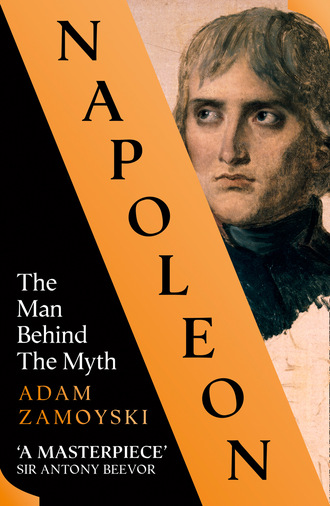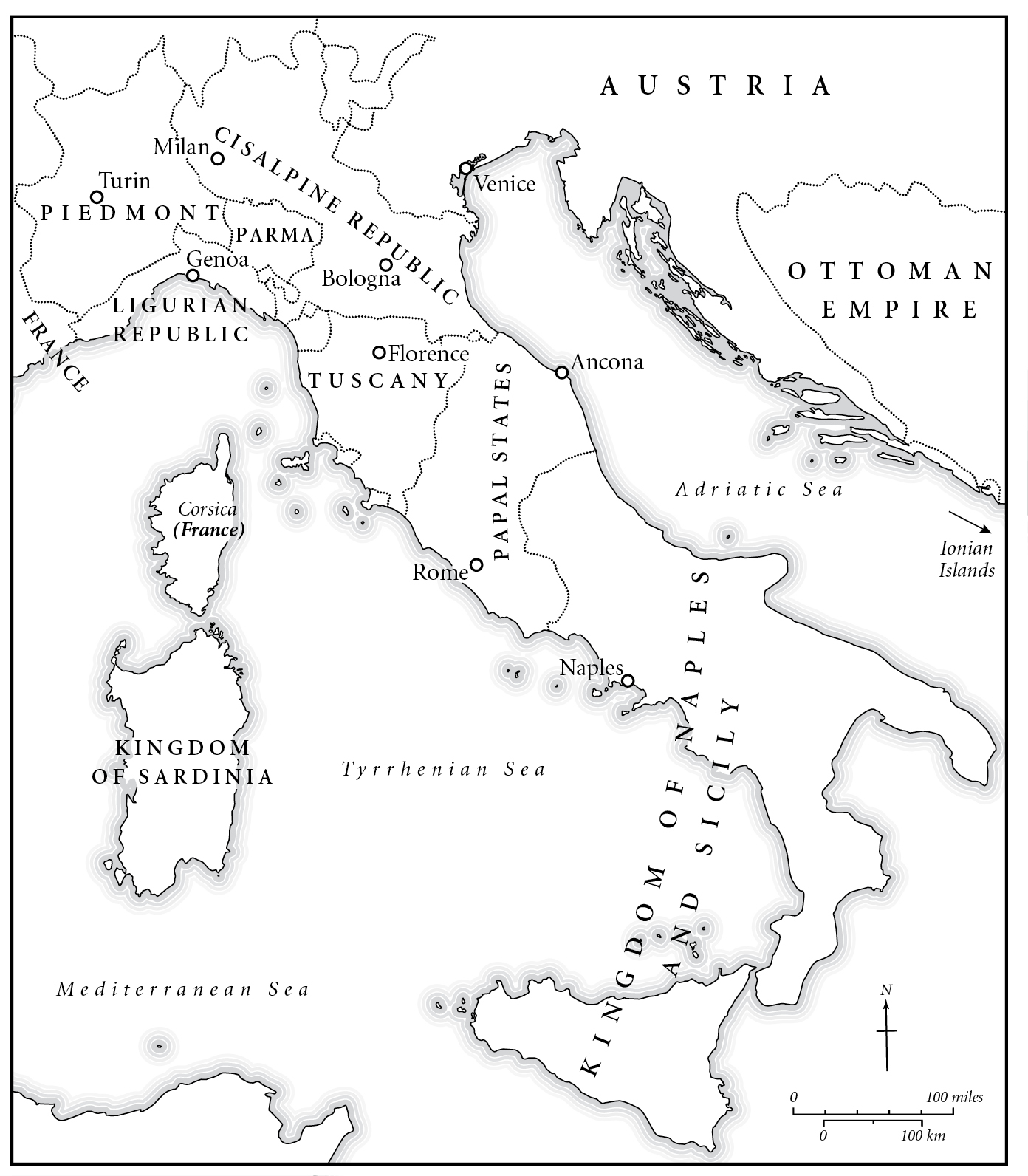
Полная версия
Napoleon
In April, the former French minister in Constantinople, Raymond Verninac, turned up at Leoben on his way back to France. He was concerned at the treatment of French citizens and interests in Egypt by the Mameluke beys who ruled it as a semi-autonomous province on behalf of the Ottoman Porte. For the past two years he had been receiving alarming reports from the French consul in Cairo, Charles Magallon, who since 1790 had been pressing for France to intervene militarily and, if necessary, take Egypt over as a colony.15
The Levant had been a French sphere of interest since the Crusades, when a French dynasty was established in Jerusalem, and later France had entertained close diplomatic and commercial ties with the Ottoman Porte. The two powers were united in opposition to Austria and Russia, both of which threatened Ottoman interests in the Balkans. Toulon and Marseille had grown up on trade with the Levant, which attracted colonies of French merchants. An Ottoman province since 1517, Egypt was ruled by a pasha nominated by the Porte assisted by Mameluke soldiers of Albanian and Circassian origin. The pasha had lost control, the beys did as they pleased, and the population suffered from their maladministration, corruption and cruelty. In the course of the eighteenth century many came to believe that Egypt was crying out for stable administration and development.
The loss of Canada and other colonies to the British in the 1760s prompted the French to look east. Featuring prominently in the art and literature of the eighteenth century, in the course of which France developed relations with Persia, the region seemed to offer great promise. The decline of the Ottoman Empire was a source of concern for France: if it were to fall apart, Austria and Russia would be the beneficiaries. A French base in Egypt would permit France to deny them that and Syria at least. It would also enable her to safeguard her interests in India, where she had a number of partisans among the Indian princes, chief among them Tipu Sahib of Mysore, who in October 1797 would make the last of several appeals for military assistance. A French force from Suez landing in Bombay at the heart of Mahratta territory would at the very least divert British forces.
As France lost further colonies to Britain in the West Indies in the 1790s, the case for acting in Egypt grew stronger. Magallon pointed out that the Nile delta provided the conditions to grow all the goods formerly derived from the Caribbean – cotton, rice, sugar, coffee and so on – while others could be obtained from neighbouring Arabia and Persia. When the British seized the Cape of Good Hope, cutting off the sea route to India, the appeal of obtaining a port on the Red Sea grew stronger, as did that of piercing the Isthmus of Suez with a canal. The idea of turning the Mediterranean into a French sea was a logical one, and with Spain onside and Corsica in French hands once more, it appeared practicable.16
When he occupied the port of Ancona earlier in the year, Bonaparte noted its strategic value and that of the Ionian islands across the Adriatic. They had been part of the Republic of Venice, and as soon as he was able to, he despatched a force to occupy them. He made overtures to the Ottoman rulers of Albania, assuring them of France’s good intentions and respect for their faith, and also to the Maniotes of the Peloponnese. Contemplation of those shores triggered a host of cultural references: Athens, Sparta, Homer and Alexander the Great litter his correspondence at the time.
Another strategic imperative for control of the eastern Mediterranean was Malta, and Bonaparte began gathering information on the state of its defences and the morale of its masters, the Knights of the Order of St John. He pressed the Directory to investigate the possibility of having a Spaniard elected Grand Master, which, Spain being France’s ally, would bring the island into France’s orbit.17
General Louis Desaix, who turned up at Mombello in late July, was intrigued to find Bonaparte poring over maps of Egypt and Syria. A year older than him, looking, according to Lavalette, ‘like a savage from the Orinoco dressed in French clothes’, Desaix had much in common with Bonaparte, always wearing a plain, poorly-fitting blue coat with no marks of rank, ill at ease in society and paying little attention to women. He caught Bonaparte’s enthusiasm, and they discussed the details of an invasion of Egypt sailing out of Venice with a corps of 10,000 French and 8,000 Polish troops.18
In his report to the Directory on 16 August Bonaparte warned that Austria was arming and would soon be in a position to field formidable forces for the reconquest of Italy, and argued that France must seek alternatives. ‘The islands of Corfu, Zante and Cephalonia are of greater interest to us than the whole of Italy taken together,’ he went on. ‘I believe that if we were forced to choose, it would be better to restitute Italy to the emperor and to keep the four islands, which are a source of riches and prosperity for our commerce. The empire of the Turks is crumbling by the day; the possession of these isles will put us in the position to support it for as long as that will be possible, or to take our share of it. It will not be long before we feel that, in order to really destroy England, we have to take Egypt.’19
Unbeknown to him, the Directory had a few weeks before received a memorandum from its foreign minister, Talleyrand, in which he put the case for seeking replacements in Africa and Egypt for the colonies lost to the British in the western hemisphere, and followed this up with three more documents developing the putative advantages, suggesting Egypt as a suitable place to begin.
The Directors had other things on their mind: they needed a general who could help them intimidate the chambers, and they approached Bonaparte. While he shared their alarm at the counter-revolutionary tide in Paris and urged them to act, he was wary of getting involved. He therefore sent them Augereau, a stalwart republican who was sure to be able to carry the troops with him. The manoeuvre had also rid him of a man he did not like or trust, and who was inconveniently popular among the rank and file.20
In the course of the past year, Bonaparte had become aware of the perils threatening him, and he created a unit of bodyguards, the Guides, to act as an escort. But he needed to make sure that the Army of Italy was also entirely his. He bought the loyalty of the other generals with a mixture of encomiums, promotions, mentions in despatches to the Directory and his Bulletins, and cash hand-outs. On the cessation of hostilities with the signature of the preliminaries of Leoben, the army was just over 80,000 strong, but a large proportion was made up of recent reinforcements, men who had seen little or no service under his command. He refrained from promoting more recent arrivals, and filled the higher ranks of every unit with men who had proved themselves under him, even if it meant giving them precedence over senior officers. On 14 July he celebrated the anniversary of the fall of the Bastille with a parade at which he honoured men and units, followed by a banquet for all those who had distinguished themselves in battle. On 28 August he presented a hundred sabres of honour, ten to cavalrymen, ninety to grenadiers, whom he was already singling out as a kind of elite, his Praetorians.21
‘What I have done so far is nothing,’ he said to Miot de Melito and the Italian statesman Francesco Melzi d’Eril as they strolled in the gardens of Mombello one summer day. ‘I am only at the beginning of the career I must pursue. Do you think it is to enhance the position of the lawyers of the Directory, the Carnots, the Barras, that I have been winning victories in Italy? And do you think it is in order to establish a republic? What nonsense! A republic of thirty million people! With our manners and our vices! It is an impossibility! It is a dream with which the French are in love, but it will pass like so many others. They want glory, they want their vanity to be satisfied, but liberty? They don’t understand it at all. […] The nation needs a glorious leader and not theories of government, phrases and speeches by ideologues which Frenchmen don’t understand. […] I do not wish to leave Italy until I can go and play in France a role similar to that I am playing here, and the time has not yet come: the pear is not yet ripe.’22
For all his cynicism, Bonaparte was still a child of the eighteenth-century Enlightenment, a believer in human progress, to be achieved through the better organisation of society. ‘A France with honest and strong government, that is what I want,’ he told Pontécoulant. He had long ago come to the conclusion that this could only be achieved by dictatorial means. While dining with his staff at Ancona in February, he had astonished them by affirming that the only decent government since the beginning of the Revolution had been that of Robespierre. Strong central authority, he explained, was necessary in order to carry the Revolution to its logical conclusion; to create new institutions based on solid rational foundations, ensure the rule of law, stabilise the currency by abolishing paper money and introducing a functional system of tax-collection, re-establish the Church as a moral base for society, regenerate its morals and make France great once more. He concluded by saying that Robespierre had only failed because he lacked the experience and strength of ‘a military commander’.23
The Directory had once again demonstrated the truth of this. Having placed Augereau in command of the troops in the Paris region, on 4 September (18 Fructidor) it felt strong enough to invalidate the April elections, expelling 154 deputies and thereby recovering its majority. Sixty-five were sent to the penal colony of Guyana. Bonaparte had sent his aide-de-camp Antoine de Lavalette to observe and report back on events. Once the coup had been accomplished, he was therefore able to gauge public reactions and act accordingly. As these had been generally unfavourable, he distanced himself from the actions of the Directory. ‘Your silence is very curious, general,’ wrote Barras, prompting Bonaparte to issue a proclamation expressing his satisfaction at the defeat of ‘the enemies of the fatherland’. In private, he condemned the coup and particularly the deportations to Guyana. Barras remained suspicious, and sent his secretary Bottot to Italy to ascertain what was going on.24
Bonaparte had acquired a new ally in Talleyrand, who had written him a flattering letter seeking his friendship. He responded with an appropriately cordial one full of praise for the minister’s distinguished record, which he, Bonaparte, would certainly reward were he to be in a position to do so. ‘You ask for my friendship, and you have it along with my esteem,’ he wrote. ‘In return, I ask for your counsels, which I will value, I assure you.’ He went on to say that the Revolution had destroyed too much and built nothing, so ‘everything remained to be done’, and the only question was who would be the one to ‘close the Revolution’. Subsequent correspondence confirmed that it was not only their views on Egypt that coincided.25
With the possibility of a Bourbon restoration dismissed by the Fructidor coup, there was no longer any reason for Austria to delay making peace. Britain too was inclined to end the hostilities, and peace talks had been going on at Lille since July between Lord Malmesbury and Charles-Louis Letourneur. But they were undermined by the Directory, which saw them as part of an Anglo–royalist plot. Bonaparte was highly critical of the missed opportunity, arguing that the British could have been allowed to keep the Cape in exchange for agreeing to a French colonisation of Egypt.26
It was not until the end of August that the Austrian chancellor Thugut sent a senior diplomat, the monstrously fat forty-four-year-old Count Ludvig Cobenzl, to direct the negotiations along with Gallo. They took up residence at Udine while Bonaparte installed himself a short distance away at Passariano, a grand country residence set in beautiful parkland belonging to Ludovico Manin, the last Doge of Venice. They skirmished ferociously but dined together, either at Udine or Passariano.
While Thugut was now eager to proceed so as to secure Venice for Austria as quickly as possible, the Directory felt strong and belligerent. Following the unexpected death of General Hoche on 19 September it appointed Augereau commander of the Army of Germany in his place, which suggested the possibility of a fresh offensive against Austria in that theatre. This was unwelcome news to Bonaparte, as it raised the possibility of Augereau stealing a march on him, or at least dimming his glory with a victory. Equally unwelcome were the despatches which arrived from Paris on 25 September informing him that the Directory was sending someone to conduct the negotiations in his stead.
He responded with one of his tantrums. ‘I am ill and I need rest,’ he wrote to Barras the same day, asking him for a discharge, adding that he wanted to settle outside Paris and enjoy at least a couple of years of peace. He wrote to the Directory in the same vein. ‘No power on earth could make me continue to serve after this horrible mark of ingratitude by the Government, which I had been very far from expecting,’ he complained. ‘My health is considerably impaired, it urgently demands rest and tranquillity. The state of my soul is also such that it needs to reimmerse itself in the mass of my fellow citizens. I have for too long had great power placed in my hands.’ The idea of Bonaparte immersing himself in the mass of his fellow citizens was too frightening for the Directory to contemplate.27
The negotiations continued, Cobenzl trying to intimidate Bonaparte with courtly mundanity, only to be met with bullying and feigned rages. The Austrian diplomat was unused to such tactics, and through Gallo he persuaded Josephine to exert a calming influence (for which she would be rewarded by the emperor). But Bonaparte was not to be controlled as he steered his own course; he was under strict orders from the Directory not to cede any part of Venice to Austria, and while he had no intention of following these, he used them to pressure Cobenzl over other things, as by then Austria was set on having the territory. At the same time, he did not want to push the Austrian too hard, as he feared a possible resumption of hostilities, for which his army was unprepared, and he reserved his belligerence for the peace talks.28
These were eventually concluded, and the treaty was to be signed on 11 October, but at the last moment Bonaparte insisted a guarantee be inserted that France would obtain the left bank of the Rhine. Cobenzl demurred. Bonaparte, who had spent two sleepless nights, was in an agitated state and fortified himself with numerous glasses of punch as he read out his proposed draft of the treaty. When Cobenzl attempted to explain the impossibility of his acceding to the new terms, Bonaparte got up from the table clearly drunk, put on his hat and stormed out of the room, vomiting barrack-room imprecations. By his own account, he smashed Cobenzl’s favourite coffee set before walking out, pursued by a vainly emollient Gallo.29

Bourrienne records that two days later he awoke to see snow on the mountaintops and informed Bonaparte of it as he roused him. With winter on its way, a French threat to Vienna through the passes was dissolving fast, and Bonaparte realised he had to conclude speedily. The treaty was signed on the night of 17–18 October, and named after a place equidistant from the two in which the negotiations had been conducted, the village of Campoformido, mis-spelt by a French secretary as Campo Formio. Bonaparte had gained most of what he wanted. He was in high spirits, and at dinner he entertained the Austrians by telling them his favourite ghost stories.30
‘My services have earned me the approbation of the Government and the nation,’ He wrote to the Directory. ‘I have received many marks of its esteem. It now remains for me only to step back into the crowd, take up the plough of Cincinnatus and set an example of respect for the magistrates and aversion for military rule, which has destroyed so many republics and undermined several States.’31
On 5 November he received his nomination as commander of a projected Army of England and also as plenipotentiary at the congress due to convene at Rastatt to settle questions arising from France’s acquisition of the left bank of the Rhine. On the morning of 17 November he left Milan with Eugène de Beauharnais. Travelling fast and through the night he was at Mantua the next day, where he paused only to review the troops stationed there, hold a ceremony in honour of the deceased Hoche and attend the theatre, before rushing on, to reach Turin at two on the morning of 19 November. He remained there long enough to have a talk with Miot de Melito, in the course of which he again expressed his conviction that ‘those Parisian lawyers who have been put in the Directory understand nothing about government’. ‘As for me, my dear Miot, I tell you that I cannot obey; I have tasted command and I would not be able to give it up. I have made up my mind: if I cannot be master, I will leave France …’32
At three that afternoon he left Turin, and two days later he was in Geneva. People came out to catch sight of him as he passed through, not just to see the victorious hero whose reputation was spreading over the Continent, but to cheer the man who had brought peace after so many years of war. ‘Vive Bonaparte, vive le pacificateur!’ they shouted. According to Bourrienne, Bonaparte was furious when one of their former colleagues from Brienne now living in Switzerland came to see him and addressed him with the familiar ‘tu’.33
He was even angrier when, after rushing on, through Berne, Basel and Huningue and reaching Augereau’s headquarters at Offenburg, he was informed that the commander of the Army of Germany was busy getting dressed and could not see him. He hurried on to Rastatt, which he drove into on 26 November in a magnificent coach drawn like a sovereign’s by eight horses, with an escort of thirty hussars, before installing himself in the Margrave of Baden’s residence.34
He impressed the representatives of the Imperial Diet not just by his grand manner but by his familiarity with the Golden Bull of 1356, the constitution of the Holy Roman Empire and the Treaty of Westphalia. On 29 November he met the prime minister of Baden, and exchanged the ratified copies of the Treaty of Campo Formio. On the same day he received a despatch from the Directory summoning him to Paris.35
Конец ознакомительного фрагмента.
Текст предоставлен ООО «ЛитРес».
Прочитайте эту книгу целиком, купив полную легальную версию на ЛитРес.
Безопасно оплатить книгу можно банковской картой Visa, MasterCard, Maestro, со счета мобильного телефона, с платежного терминала, в салоне МТС или Связной, через PayPal, WebMoney, Яндекс.Деньги, QIWI Кошелек, бонусными картами или другим удобным Вам способом.







